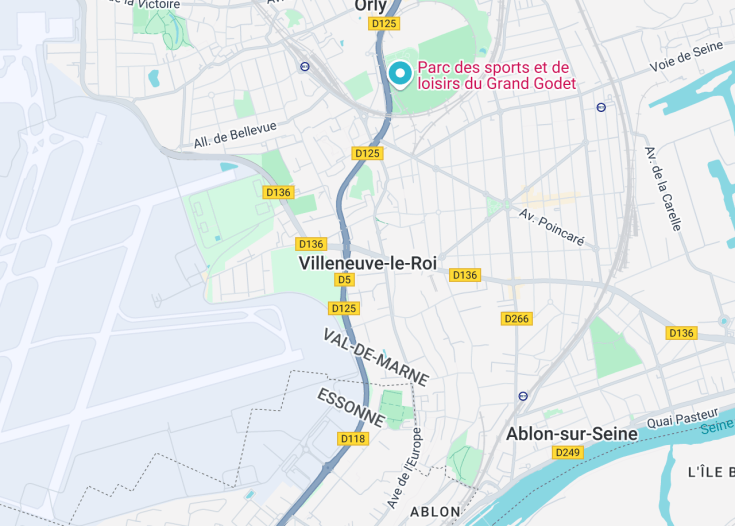Villeneuve-le-Roi is a charming commune in the southern suburbs of Paris, France, notable for its rich historical heritage and scenic landscapes. Nestled along the banks of the Seine River, it offers a tranquil escape from the bustling city life. Visitors can explore architectural marvels such as the Saint-Pierre-et-Saint-Paul Church and the Château de Villeneuve-le-Roi. The town also provides ample green spaces and cultural activities that enhance its appeal as a must-visit destination.
For an authentic local experience, visit the weekly market held every Wednesday and Saturday. It’s the perfect opportunity to indulge in fresh regional produce and artisanal goods.
Consider timing your visit to coincide with the annual Fête de la Musique, celebrated in June. This event transforms the town into a lively festival with music performances throughout.
Top things to do & see in Villeneuve-le-Roi
Select the following sights and activities to discover best tickets and tours available in Villeneuve-le-Roi.
Villeneuve-le-Roi: A Hidden Gem in the Heart of France
| Country | France |
| Time in Villeneuve-le-Roi | GMT+1 |
| Language spoken | French |
| Population | 18,995 (source: latest municipal data) |
| Currency | Euro (€ EUR) |
| Airports |
|
Villeneuve-le-Roi, positioned just southeast of Paris in Île-de-France, boasts a rich history that dates back to the Roman era. Perfectly blending historical charm with modern amenities, this scenic town acts as a tranquil getaway from the bustling city life of nearby Paris. With its idyllic settings along the River Seine, Villeneuve-le-Roi attracts individuals who cherish calm and culture, offering intimate bistros, picturesque parks, and intriguing local museums.
Once famed for its vineyards during medieval times, the town has evolved into a tranquil residential suburb with excellent connectivity to central Paris. Its cultural fabric is enriched with local festivals, art exhibitions, and public markets that showcase the community’s harmony and vibrant social scene. Indeed, Villeneuve-le-Roi captures the quintessence of French town life, making it a desirable location for both residents and travelers seeking a blend of peace and proximity to France’s cultural epicenter.
Where is Villeneuve-le-Roi?
Situated in the southeastern suburbs of Paris, Villeneuve-le-Roi offers a peaceful setting near the buzzing metropolitan heart of France.
Distances:
| Route | Distance by car | Time by car |
|---|---|---|
| Paris to Villeneuve-le-Roi | 12 miles (19 km) | 25 minutes |
| Orly to Villeneuve-le-Roi | 3 miles (5 km) | 10 minutes |
| Versailles to Villeneuve-le-Roi | 18 miles (29 km) | 35 minutes |
What is Villeneuve-le-Roi famous for?
Villeneuve-le-Roi is renowned for its serene riverside landscapes and historical links to aviation through the nearby Orly Airport. The town’s green spaces and proximity to Paris make it an attractive suburban retreat.
History
Prehistoric Times to Roman Era
The area that now forms Villeneuve-le-Roi was first inhabited by prehistoric peoples who left behind relics, such as tools and pottery, indicating their presence. With the advent of the Romans during their conquest of Gaul, a small settlement began to appear, taking advantage of the strategic location near the Seine River.
Medieval Period (5th to 15th Century)
During the medieval period, the area saw a significant transformation as part of the royal estates of France. The town’s name, Villeneuve-le-Roi, directly translates to “New Town of the King,” reflecting its status under royal patronage. In this era, a fortified castle was constructed, around which the town gradually developed. Villeneuve-le-Roi became a notable market town due to its position on the river trade routes.
Renaissance to Revolution (16th Century to 1789)
In the Renaissance, Villeneuve-le-Roi prospered as it became a hub for artisans and traders. However, its fate took a dramatic turn during the French Revolution, where it witnessed substantial socio-political upheaval. Many of its historical structures suffered during this period, but the town survived and continued to grow in the ensuing peaceful years.
Industrial Era to Modern Day (19th Century to Present)
The 19th century marked the beginning of industrial development in Villeneuve-le-Roi. The establishment of railways and factories attracted a wave of workers, increasing the population and changing the town’s character from a rural village to a suburban area. Today, Villeneuve-le-Roi is recognized for its rich history, well-preserved historical sites, and its blend of traditional charm and modern amenities, making it a unique part of the French historical landscape.
Visit Villeneuve-le-Roi
What to see and do in Villeneuve-le-Roi
Villeneuve-le-Roi, nestled by the scenic banks of the Seine River, offers a variety of attractions and activities. Explore the historic town center with its charming streets and traditional architecture. Don’t miss the Saint-Pierre-et-Saint-Paul Church, a gem of Gothic architecture. Nature enthusiasts will enjoy the Parc du Grand Godet, offering serene walking paths and picturesque landscapes. For a deeper dive into local culture, visit during the market days when the town buzzes with local artisans and producers.
- Explore the historic castle ruins
- Visit Saint-Pierre-et-Saint-Paul Church
- Stroll through Parc du Grand Godet
- Experience local markets
Festive Villeneuve-le-Roi
Annual events in Villeneuve-le-Roi reflect its vibrant community spirit. The town hosts several cultural and music festivals throughout the year. Notably, the Villeneuve Jazz Festival in early summer attracts jazz lovers from across the region, offering live performances in various venues around the town.
Best time to visit Villeneuve-le-Roi
The ideal time to visit Villeneuve-le-Roi is late spring through early autumn, from May to September. During these months, the weather is generally pleasant, perfect for exploring the outdoor attractions and participating in local festivals.
Is Villeneuve-le-Roi worth visiting?
Villeneuve-le-Roi, with its rich historical heritage and charming ambiance, presents a compelling case for visitors seeking a blend of history, culture, and natural beauty. While it may not boast the grandeur of major tourist destinations, its quaint charm and less crowded environment offer a more relaxed and authentic French experience. However, visitors looking for bustling city life might find it quiet. Nonetheless, for those interested in history and culture, it certainly merits a visit.










